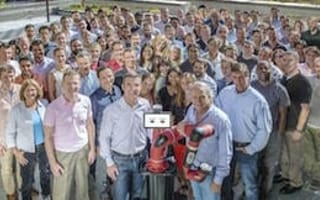With offices ranging from two employees to 200, tech companies in Boston come in all shapes and sizes. So what's the difference between a startup and a regular ol’ company?
Does it have to do with the number of employees or how long the company has existed? Or, perhaps it’s just a shift in culture. We caught up with three different companies to hear how they separate the startups from the grown-ups.

Responses via Jay Habegger, CEO 
Do you still consider ownerIQ a startup?
Yes.
How has growth changed your company's culture?
Growth changed many priorities, from the stake of our decisions to how fast we were able to make those decisions. Every time we make a decision we have more resources to do more. When you’re a small company you can be nimble. You can make a significant difference and fast. As you grow as an organization, it inherently takes a longer time to make decisions.
When and how did you decide if you're still a startup?
ownerIQ is a company that’s solving business problems in a new and different way. We don’t have a scripted playbook or roadmap to follow, and that’s really how a true startup functions. You leave the startup phase when you are no longer innovating, ownerIQ will always be innovating.
How has your involvement in the startup community changed as you've grown?
As ownerIQ has grown to where it is today, my focus shifted to the advertising technology industry and investor community. This ensured certain necessary elements of innovation and positioned ownerIQ as a leader in the marketplace. At the same time, I feel that playing a bigger role in the local startup community is important for a variety of reasons, especially when considering the rapid pace of change in our industry.
What values do you think are emblematic of a startup?
Focus on the details. Be Intellectually flexible, rigorous and honest with yourself.

Responses via CEO Max Versace 
Was Neurala ever considered a startup?
Yes, but, interestingly, when we started in 2006 to contain a patent on using GPU for neural networks and AI, we did not consider it that way. Instead, we used Neurala to do some cool projects on the side while pursuing our PhDs.
Do you still consider it a startup?
Yes, and it has much to do with the focus of Neurala, which combines two very high-tech fields: AI and robotics. Sometimes the term “startup” is a bit fuzzy in its meaning. I believe Neurala will be considered a startup until we reach a critical mass of, say, 100 people and what we do is more “normal” and ubiquitous in business and society.
How has growth changed your company's culture?
So far, our culture has not changed a lot. But we are already experiencing a shift as we grow to 30-40 people in 2017, with a more diverse employee spectrum. Processes are being put in place, which will definitely result in changes in the way Neurala operates and feels.
How has your involvement in the startup community changed as you've grown?
I have transitioned from being helped by CEOs of older companies to helping CEOs of younger ones.
What values do you think are emblematic of a startup?
Persistence is the No.1 feature of startups of our kind (and their executives). People are going to tell you "you're crazy" and "this won't work." You need to be disciplined and stay the course. Another value is empowering employees to think big: everybody in a startup is essential and can move the needle substantially.

Responses via Jim Lawton, Chief Product & Marketing Officer 
Was Rethink Robotics ever considered a startup?
We definitely considered our company a startup from the inception of the company in 2008 through the launch of our first robot Baxter in 2012. Not only were we a young company, but we were pioneering a new category of robot and disrupting the way manufacturing had been performed for decades.
Do you still consider it a startup?
Our company is no longer a startup as we have grown significantly since the early days of creating Baxter, our first robot. Rethink Robotics is a global company, with distribution in China, Germany, Australia, Spain, Mexico and many more countries across the globe. With major customers ranging from DHL to General Electrics, Rethink’s robots are driving growth for manufacturers of all sizes, locations and scales.
How has growth changed your company's culture?
We’ve worked very hard to maintain the innovative and creative culture that helped us grow, but it would be untruthful to say that culture has not changed. Any company that grows as rapidly as ours is going to experience culture change. The simple logistics of having more people, more departments and more global reach make it a different experience than it was at the very start. Still, we have definitely been able to maintain an atmosphere of innovation and tried to keep as much of that “startup” culture as possible.
When and how did you decide if you're still a startup?
There isn’t necessarily a single point where you simply decide you’re no longer a startup, it’s more of an evolution. There are a variety of factors that play into the growth and maturity of a company. For Rethink Robotics, we’ve introduced industry-changing robots, led the software revolution in manufacturing and now customers in countries around the world. As we’ve grown in size, revenue and global reach, the view of our company, both internally and externally, has evolved from innovative startup to industry leader.
How has your involvement in the startup community changed as you've grown?
The great thing about Boston is that the technology community seems to work together for companies of all sizes. Our company continues to participate in many local events, from the recent MIT Inclusive Innovation competition to the Robotics Cluster as part of MassTLC. Many of the companies in these events are startups and some of them are much larger.
Perhaps the biggest change is that more companies are now coming to us for advice on how to grow and succeed, but, really, it’s been a steady presence in the startup community throughout our company’s history.
What values do you think are emblematic of a startup?
The two most significant values are innovation and disruption. There are a lot of factors in determining whether a startup becomes successful, but, at its core, a startup is about bringing creative new businesses to the market place. The other aspect is an ability to pivot. Not every step of a growing company goes exactly according to plan, and effective startups can effectively pivot when the time is needed.
Some responses have been edited for length and clarity.
Photos via companies
When do you think a startup is no longer a startup? Let us know or tweet us @BuiltInBOS








